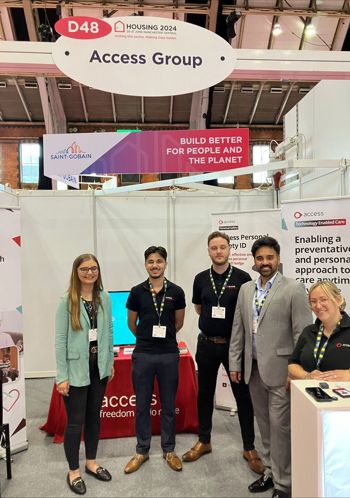
Supporting independent living
One of the first key themes acknowledged when discussing the integration of housing, health, and social care sectors is why we should do this. Well, ultimately it increases and better supports independent living allowing individuals across the housing sector to live the lives they want and be settled in a place they can call home.
To do this there are two key steps that all stakeholders have to follow whether you are a local authority, housing provider, housing association, housing charity, or a landlord, everyone has a role to play which they must be held accountable for.
1. Communication
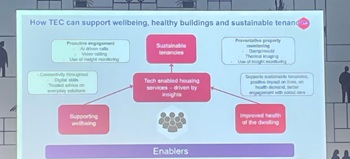
Communication is crucial for the integration of sectors to work, not only amongst stakeholders but with the individuals themselves. Without involving the individual you risk not providing the support required, increasing the risk of hospital admissions and declines in mental health, as well as significant cost expenditures trying to make things right when budgets are already restricted.
Debra Edwards, Champion of Co-production highlighted her inspirational story of how she acquired her disability and what life was like for her:
“It wasn’t until I had a mental breakdown that the adaptations to my home were made. If you asked me first I could have saved you money by telling you what I need.”
Here her powerful story recognises the importance of listening to what people need to increase their independent living by engaging with all tenants, especially disabled tenants. With 82% of people acquiring a disability in their lifetime, it is clear much more needs to be done to empower independence through accessible housing.
Cathy Smith, Joint Strategic Impact Group Chair at Harbinteg Housing Association highlighted how this can easily be achieved by joining up services but mindsets around providing accessible housing must change for the better, here she emphasised the importance of seeing all tenants as people, without medicalising disabilities.
2. Co-producing and collaboration with stakeholders
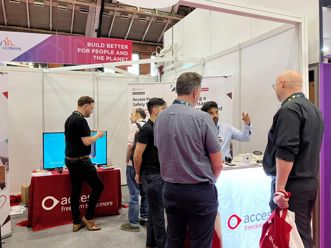
Across multiple talks throughout Housing 2024, it was also made clear change can only happen and be successful when everyone works together to achieve shared goals. This way, with many local authorities and organisations struggling with budget constraints more holistic funding approaches can be used leading to more sustainable initiatives.
As a result, we can also use better evidenced-based policies collectively to demonstrate the effectiveness of integrated care models with technology bridging the necessary gap to bring all stakeholders and data together.
Here using technology, particularly technology enabled care, helps turn population health management into proactive health management providing better and more person-centred preventative care and support to enable independent living.
Incorporating technology enabled care within housing strategies therefore provides stakeholders across the sector with better insights into daily activities to provide not just the support an individual requires but what they want too. This way including them through the process ensures that the technological solutions are used effectively to achieve the planned and ideal outcomes. Otherwise, you increase the risk of wasting funding on technology enabled care solutions that individuals either don’t understand how to use or want to.
Preventing Homelessness
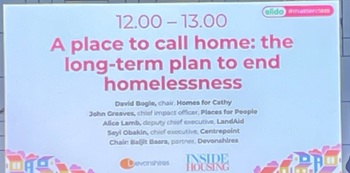
As well as discussing the power of technology enabled care across housing, health, and social care, another key theme addressed throughout the event is how and what are the best ways to prevent homelessness across the country.
Across the three-day event, many insightful and inspiring talks were held demonstrating best practices and projects different housing associations and local authorities have conducted to prevent homelessness as well as better support children in temporary accommodation.
What was made clear is no solution will work if it doesn’t include landlords or housing organisations. For any homelessness prevention strategy to work a multifaceted approach is crucial to help build stronger long-term strategies to break the cycle of homelessness, secure permanent housing for the homeless, and prevent homelessness altogether.
Again it was also made clear when managing temporary accommodation better education is needed to understand it’s vital to listen and apply what the individual or family needs. Whether it’s accessible transport to travel to and from school or work, or amenities such as a laundrette, without having this information, you increase the risk of the rate of homelessness only increasing and the issues that made them homeless in the first place never being addressed, resulting in higher demands, longer waiting times, individuals living in inappropriate housing, and ultimately a poorer quality of life for individuals in your community.
Across the Housing event, multiple speakers demonstrated some of the ways they are trying to break the homelessness cycle to support independent living, improve quality of life, and most importantly enable people to get back on their feet so they never fall back into the homelessness cycle again.
1. Rochdale Borough Council
Rochdale Borough Council wanted to find ways to ensure all temporary accommodation changes were more self-contained. To do this, they made sure that all travel costs were considered in placements overcoming issues of travel for education and work, as well as designating time to upskill their temporary accommodation workforce on the importance of housing standards. This, in turn, has ensured temporary accommodation for families to have secure and safe spaces for children to do their homework, as well as sleeping spaces for babies.
Rochdale also goes one step further than this by providing support to help families break the homelessness cycle permanently. They do this by allowing families to take cots and beds for babies with them once they move on to reduce stress so they can concentrate on making their house their home.
Whilst discussing the steps they have made to better prevent homelessness and how to deliver effective homelessness support, Hannah Courtney-Adamson, Strategic Housing Lead, did acknowledge that bed and breakfasts are still being used a lot to facilitate temporary accommodation, as it’s a symptom of high housing issues, so now they are looking at ways of using private rental areas to use capital investment and council-owned land to better manage demand and stock. Once again it was highlighted how the power of co-production helps these prevention strategies go one step further by partnering with social investment models to make the necessary community changes needed.
2. Switch Hospitality Management
Another clear example of how co-production can help with preventing homelessness strategies is Switch’s example.
Here John Angus, the Managing Director, explained how they helped prevent homelessness within their hospitality management company by keeping their hotels open across Birmingham City Council to create more temporary accommodation during Covid.
Due to having all the facilities needed that were already maintained well, offering hotels as temporary accommodation was a great way to change perspectives to make a difference. The properties they offered had specific cooking facilities as well as a room for children after school with laptops for homework.
With this changed mentality over the last four years they have been able to house 1000 people a week with the number growing every day due to scaling this project to other hotels Switch manages across the county. Now they have contracts with 15 local authorities and have 5 hotels in London alone offering temporary accommodation.
John explained how they constantly strive to improve their service further by offering quarterly customer service checks. In their last one, there was a 78% customer satisfaction in Birmingham, clearly demonstrating the power of collaborative working between stakeholders to create models to transform a room to be self-contained, reducing waiting lists in bed and breakfasts whilst making a difference to the individual and the community.
Both examples demonstrate the importance of being collaborative, innovative, and strategic in establishing homelessness prevention strategies to improve quality of life, reduce homelessness, and provide better-targeted support that enables individuals and families to cope with their independent living.
The power of AI and how it can overcome housing problems in the future?

Another key theme that was addressed throughout the Housing 24 event was the power, capabilities, and opportunities of technology, and the use of artificial intelligence was no different.
Discussions surrounding AI and how it could overcome the national housing challenges across the next 5 to 10 years highlighted that when used correctly AI can make meaningful impacts on society and change. Whether it is integrating customer service platforms and queries, to using actionable insights to help overcome fuel poverty, a variety of opportunities were suggested in how AI could help.
From these discussions, it was clear that homes for the future must have data at the core to identify where improvements in the home and care provisions can be made. Key insights about increasing independent living were also highlighted to build healthier and happier lives.
Whilst, the majority of conversations were discussing what could happen, these discussions did highlight how we can make a start in using AI now to initiate change.
One of the best examples was how we could use AI to help overcome fuel poverty by using data to work with energy suppliers, local authorities, and health and social care to prevent negative outcomes for individuals unable to afford to heat their homes. This example demonstrated how issues surrounding paying bills can be identified before winter hits and crises occur by energy providers using payment data to contact local authorities to conduct a welfare check and provide the correct provision needed.
It was also addressed that using AI will also help to inform stakeholders on the right workforces needed for particular issues, concerns, or needs. Whilst the capabilities of AI were highly praised, the main overarching takeaway showcased was that AI and any technological solution should benefit the individual to deliver their needs and preferences, instead of assuming what is needed, as that way, we can educate how AI can make those changes with limited resistance and ultimate engagement.
Key Takeaways of Housing 2024
Across the three-day event, there were lots of insights, inspiring stories, and panels that took place. The list below showcases 10 key takeaways all stakeholders should consider when moving strategies forward to overcome national housing challenges to support independent living and improve quality of life.
- Collaborative strategies involving stakeholders across sectors, including individuals themselves, are crucial to addressing housing challenges nationwide.
- Integrating solutions and utilising technology enabled care enhances co-production, consolidating actionable insights for better outcomes.
- Effective homelessness prevention demands a comprehensive approach involving landlords, individuals, and families to break the cycle effectively.
- Co-produced strategies for housing issues can enhance access to tailored mental health support and interventions based on individual needs.
- Promoting awareness of technology enabled care facilitates sector integration by pre-emptively addressing crises, promoting independence, reducing pressure on primary and emergency care as well as social care and care home, and, as a result, reducing healthcare costs.
- Commercialising technology enabled care can redirect resources from crisis management towards proactive solutions, benefiting local authorities and communities alike.
- Technology enabled care plays a pivotal role in transforming the housing sector, bridging gaps between housing, health, and social care.
- Housing management systems are essential for proactive health management, supporting at-risk individuals, and preventing homelessness.
- Leveraging technology, including TEC, fosters cross-sector collaboration to develop sustainable, impactful solutions across multidisciplinary teams.
- Through ongoing dialogue, innovation, and partnerships, we can all aim to ensure everyone has access to stable housing and the support they need to lead fulfilling lives.
Next Steps: How can Access HSC help overcome housing problems to support independent living and both prevent and reduce homelessness?
In conclusion, the insights gathered from the Housing 2024 event underscore the critical need for collaborative strategies that integrate housing, health, and social care, placing individuals at the heart of digital transformation efforts.
Helping ease co-production:

Access HSC is committed to bridging the gap between housing, health and social care. Through Access TEC, guiding stakeholders in leveraging technology enabled care to streamline processes and enhance service delivery, awareness of the benefits of TEC can be raised to empower stakeholders to proactively integrate these solutions into housing. This, in turn, helps provide effective training needed to ensure tailored support that maximises ROI for all involved.
The Government of Jersey, for example, through digitally transforming their services across Jersey was able to improve coordination between services and overcome inefficiencies for their older populations. Now they are fully optimised and educated in using technology enabled care. Our seamless migration from analogue to digital ensured the quality of care and support for their residents didn’t reduce, so they could be confident living independently with the reassurance support they needed would be there when they needed it.
Create Virtual Homes:
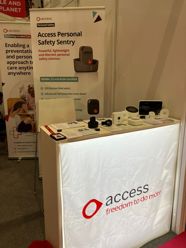
Our approach extends beyond technology implementation; it aims to create virtual homes where individuals feel secure and supported. At Access TEC our smart alerts offer reassurance while promoting independence. By being TEC Quality Certified we know our Access TEC ecosystem meets their 10 common standards to solely concentrate on safety, innovation, quality, and continuous improvement.
At Housing 24 there was a discussion about how we can raise awareness about technology enabled care before individuals hit crisis point, and that one way we could do this is to commercialise TEC so individuals themselves are exposed to the power of technology enabled care and what it can offer to them to improve their independence and personal safety a lot earlier.
At Access TEC and Access Personal Safety, we are already making this step by joining partnership with Medequip Connect and Sutton Council with the opening of their technology and technology enabled care service hub in Sutton. Being the first of its kind, we are providing the shop with the latest equipment, digital solutions, and informed advice to help people remain independent in their own homes.
We make it our aim that all individuals can benefit from technology enabled care and ensure they are involved in the planning process to meet their diverse needs effectively including older adults, people with learning difficulties, and people living with disabilities all without medicalising their conditions so they are seen and treated only ever as people.
Fostering Community Health and Wellbeing

Access HSC provides support for both physical and mental health and wellbeing to fully ensure an integrated approach is delivered when supporting independent living. At Access Elemental Social Prescribing, we know that housing is one of the most popular wider social determinants of health and how it can impact someone’s mental health. By fostering stronger multidisciplinary teams through improved population health management with our digital social prescribing platform, identifying and supporting at-risk residents can happen earlier to encompass both mental and physical health care.
Warm Wales, for example, is a community interest company that works hard to tackle fuel poverty. By embedding social prescribing in housing to their service they have been able to expand and scale their social prescribing service across Wales and since April 2020 they have received over 4,200 referrals, and delivered over 7,600 interventions, generating cost savings of over £521,000.
Learn more about social prescribing in housing by contacting us today and we can help you build stronger multi-disciplinary teams focused on improving community health and wellbeing.
Preventing Homelessness

Furthermore, Access Adam Housing plays a pivotal role in homelessness prevention, automating compliance for temporary accommodation providers and incentivising landlords to offer stable, long-term tenancies.
Milton Keynes City Council, for example, has been able to experience multiple benefits to improve the quality of life for their residents in many ways.
Through using our housing management solution their supplier base for high-quality temporary accommodation has increased from 4 to 20 and through us working collaboratively we have been able to create a bespoke tool to help them with their AST scheme. As a result, they have been able to secure tenancies for at least 2 to 3, providing support to their residents so they never get stuck in the homelessness cycle again.
Now they have 99.5% of properties fully compliant and over 200 houses compliant for their AST Scheme helping reduce the number of people in hotels from 100 people a night to 8.
Together, these efforts not only prevent homelessness but also enhance community resilience and wellbeing, demonstrating our commitment to transforming housing outcomes through innovative, person-centered solutions. For more information on how we can help enhance your homelessness prevention strategies contact us today.
Bridging the gap between housing, health, and social care
It is clear from the Housing 24 event there is an urgent need for integrated strategies that unify housing, health, and social care whilst centering around individual needs in the digital age.
At Access HSC we offer multiple solutions to help you address your housing need to bridge this gap and empower stakeholders to seamlessly integrate technology enabled care, social prescribing, and housing management solutions into your housing strategies.
Contact us now to discover how we can collaborate to support independent living, through innovative, person-centred co-production approaches today.

 AU & NZ
AU & NZ
 SG
SG
 MY
MY
 US
US
 IE
IE
